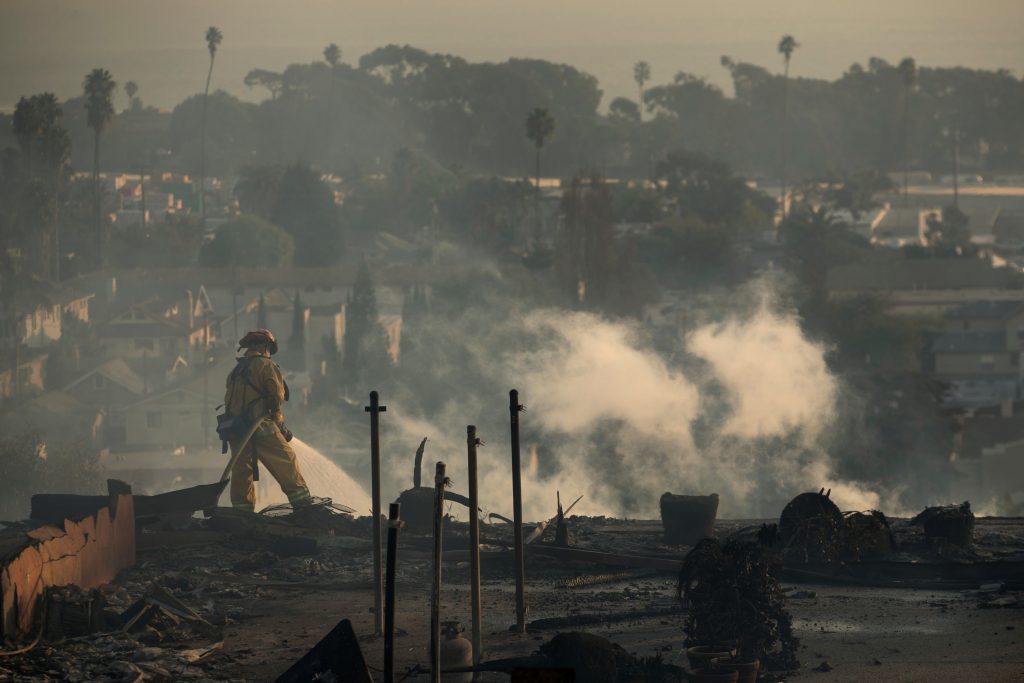This has been an Advent of scorched earthrnand whole communities burned to the ground, thousands of our brothers andrnsisters made refugees and displaced persons in their own hometowns.
The stories of loss are heartbreaking —rnfamilies and small business owners who have lost everything.
The wildfires keep burning as I write thesernwords, and it looks as if it is going to be another long week. Even where firesrnare not burning, in many parts of the Archdiocese of Los Angeles the ash andrnsmoke from the fires stings the eyes and makes it hard to breathe.
All week I have had words from Scripture inrnmy mind, from the story of the prophet Elijah’s encounter with God on the holy mountain:rn“But the Lord was not in the fire.”
And it is certainly possible to feel thatrnway this week.
Always it is the same question: Where is Godrnto be found when natural disasters strike and bad things happen to good people?rnWhy does he allow famines and fires and earthquakes and floods?
In the face of loss and suffering, thernanswers that our Christian faith provides are not always satisfying — even ifrnthey are true.
We always need to respect the pain ofrnothers; we have no idea what they are going through. And we need to remember: Therernis probably no greater challenge to faith than trying to keep believing in God’srnlove when it seems that he has left you and allowed you to suffer.
There is a lot of talk these days inrnCalifornia about a “new normal” — people say drought and wildfires are thernprice we have to pay for climate change and global warming. I do not find thesernexplanations satisfying either.
The hard truth is that there are no easyrnanswers. But that does not mean that the Lord is not in the fire.
God is everywhere. Jesus said a sparrowrndoes not fall from the sky in God’s creation without God knowing about it andrncaring about it.
In that story of Elijah, it says: “Afterrnthe fire there was a tiny whispering sound.”
God is speaking in every moment, in everyrncircumstance. But sometimes he speaks in a whisper. He asks us to listen, tornhave ears to hear.
What he is telling us in these situationsrnis that life is precious, but it is also uncertain and fragile. We should livernfor God every day and cherish every minute and not take anyone or anything inrnour lives for granted.
It is sad, but we have a tendency to wantrnto keep our distance from those who are in pain and suffering. We feel helplessrnsometimes, embarrassed. We do not know what to do. We sometimes look the otherrnway when we see someone begging on the street or in front of the church.
In times of disaster, these barriers ofrnpride and indifference all fall down. We feel more clearly our common humanity,rnthat we are all in this together. We realize how much we need one another andrnhow much we need God.
We have seen that again this past week, inrnthe wake of the fires. The stories of loss have been matched by so manyrnbeautiful stories of extraordinary heroism and ordinary human kindness.
The Lord is in the fire!
He is there in all these stories of sharingrnand self-sacrifice, in all those who are opening their homes to strangers, in allrnthose who are risking their lives to save others. The Lord is there in thernoutpouring of donations and in all of the volunteers serving selflessly in ourrnCatholic Charities and St. Vincent De Paul Society.
Jesus said, “Blessed are those who mourn,rnfor they shall be comforted.”
The Scriptures tell us that God will wipernaway every tear from every eye. And Jesus calls us to be the ones who make goodrnon this promise.
“They shall be comforted,” Jesus commands. So,rnwe must be the ones who will bring them comfort. We must be the ones who weeprnwith those who are weeping, and we must be the ones who dry their eyes.
And we need to be the ones also who standrnby their side and help them to rebuild and go forward with courage and faithrnand hope in God.
Pray for me this week and I will be prayingrnfor you.
As I finish this column, I am preparing forrnour “ma√±anitas” celebration tonight at the cathedral, the great feast of OurrnLady of Guadalupe. And I am reflecting on her beautiful words to St. Juan Diego:
“Dornnot let your heart be disturbed. … Am I, your Mother, not here? Are you notrnunder my shadow and protection? … What more do you need?”
I pray that our Blessed Mother, in herrntender love, will help all of us to listen and to hear the tiny whispering voicernof God in these days after the fire.
You can follow Archbishop Gomez daily via Facebook, Twitter and Instagram.

